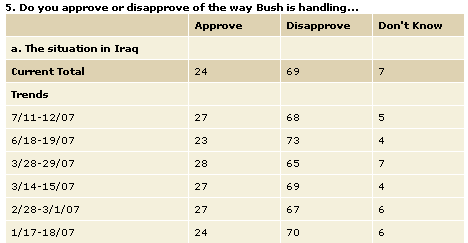HARD AND SOFT AMERICA
Michael Barone reflects on the oddity that
One of the peculiar features of our country is that we produce incompetent 18-year-olds and remarkably competent 30-year-olds.
His thesis, in a nutshell, is that our kids are comparatively coddled but our adults are comparatively forced to compete.
This analysis has drawn howls of protest by Matt Yglesias and his commentators, with a nod of approval from Kieran Healy.
I’m sorry, but Professors Volokh and Reynolds are wrong and this Michael Barone article sucks. The main problem with his thesis is that he has no data to back it up whatsoever. None. In Barone’s defense, the “I have no data to support my claims” problem is also the only flaw in his argument.
UPDATE: Upon reflection, this article is dumber than I thought. Does Barone really think we beat the Iraqi Army because Saddam is some kind of old softie who coddled his troops? Was life under the Taliban softer than life in the USA? Is this how we brought down Communism?
Posted by Matt Yglesias at May 10, 2003 09:52 PM
The arguments posted by Yglesias and his readers make me wonder whether we read the same article. In the one I read, Barone isn’t making any arguments whatsoever about why our kids were able to beat Saddam Hussein or making any comparisons whatsoever between the US and the Third World.
He is instead trying to explain why it is that, by measures of standardized reading and math tests, Americans are among the worst in the Developed World at the time of high school and yet we manage to nonetheless produce competent adults and the most competitive economy in the world.
His thesis, which seems interesting, is that compared to other developed societies, our school system is rather soft and thus our kids aren’t put under the same pressures, but that our adult society is comparatively more competitive. This strikes me as plausible: In most developed countries, the education system is tracked based on “merit,” so only those who show promise at an early age have a shot at a university education. They also go to school pretty much year-round and in some cases on Saturdays, whereas ours typically go 180 days. Thus, US=soft; them=hard. By contrast, in later life, the US economic system is much more dog-eat-dog. Fewer guarantees, fewer government programs, less redistribution of income. Thus, US=hard; them=soft.
Now, granted, univariate analysis with no data aside from anecdote doesn’t make for very good social science. But, then, this isn’t an academic article but rather an op-ed column in a news magazine.






Very good analysis, James. On a societal level, I don’t think Yglesias would be satisfied with any “data” that Barrone could point to.
But you’re right. The article is political rhetoric, not polished academia. It reminds me of the dust-up earlier this week between Volokh and the economist. If all the left has left is cries of “insufficient data,” then they just don’t understand the game.
More to the point, Yglesias claims Barrone’s article “sucks” because it provides no data, but he provides no further data to back up his contention that the article “sucks.”
Mr. Pot, allow me to introduce you to Mr. Kettle.